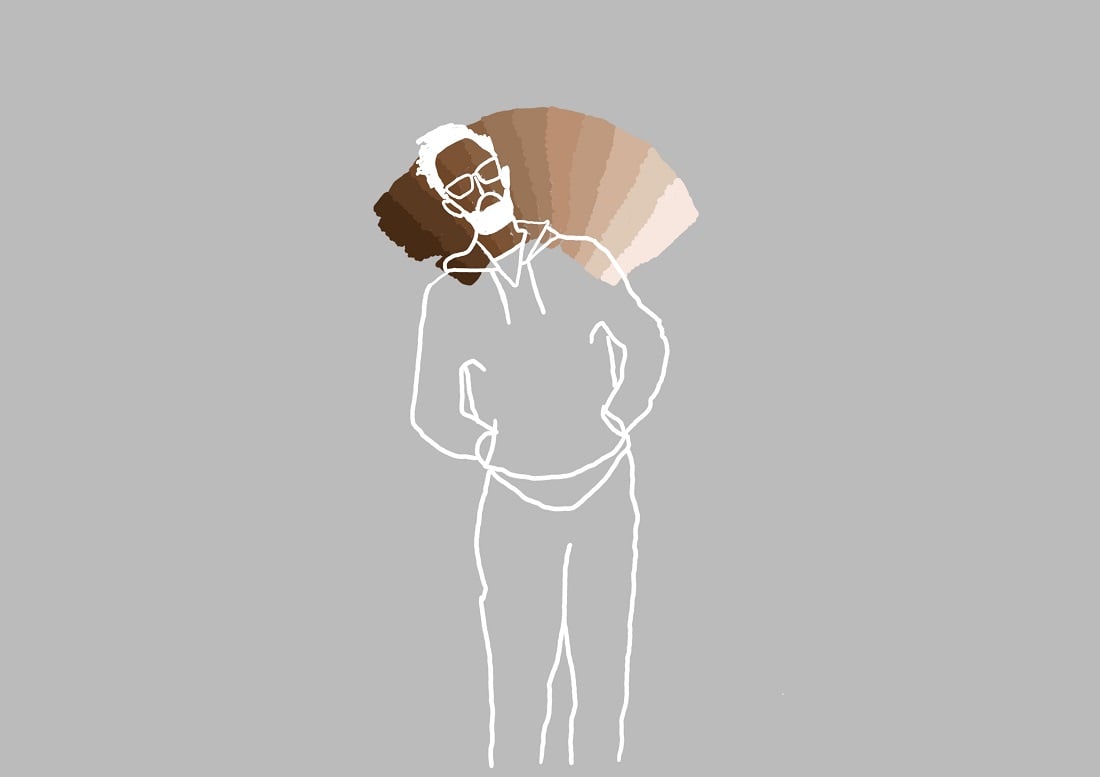
Spectrum by Hetain Patel (video still)
Distribute your leadership digitally
Long-distance relationships needn’t limit ambition. Sarah Fisher, Ying Kwok and Lindsay Taylor describe a sustainable approach to sharing the physical and digital demands of curation.
Our goal was to build meaningful and sustainable partnerships between the visual arts sectors in the UK and Hong Kong. What emerged as a pilot project, after political unrest and the pandemic cancelled trips to Hong Kong, was Peer to Peer: UK/HK.
First contact
The digital platform and festival are built on an exhibition model first developed in 2019, whereby curators and directors across the UK and China nominated photographers who they felt deserved greater international recognition for an exhibition hosted in Liverpool and Shanghai. For Peer to Peer: UK/HK we adapted this model to connect partners in the UK and Hong Kong digitally and provide opportunities to profile artists internationally in the absence of physical exchange.
Although in future our ambition is to return to physical exchange, this digital model has raised questions about the sustainability of speculative research trips and a need to be mindful of the industry’s impact on the climate. Through this model we have established relationships with and between future delegates in advance of any physical trip, ensuring that any future exchange is far more meaningful, has clear outputs and outcomes, and builds on what has already started to form.
Taking shape
Peer to Peer: UK/HK uses a model of distributed leadership, providing an open invitation for all partners to take ownership. It creates an arena in which people can shape or lead a particular activity or area of work. We started by inviting individuals from visual arts organisations across the UK and Hong Kong to introduce themselves and their interests through a series of webinars. They were then invited to shape the online festival by nominating artists for commissions, or by showing existing work or undertaking social media residencies. Themes for the panel events emerged through the initial webinars. Partners chaired the sessions and, through partnering organisations with shared interests, we hoped to set the foundation for future collaborations.
This leadership model has ensured the festival is truly diverse, showcasing perspectives that reflect the multiple interests of the individuals and organisations across both countries. It has brought together a much broader group of artists than if they had been selected by one individual curator. For the artists, nomination can provide a powerful endorsement – and provoke curiosity as to who has nominated who. The artists involved in the festival have been introduced to new curators. Organisations have begun building relationships with these curators and are able to reach new international audiences.
Seeing results
The programme and its model have led to some great outcomes. The five new commissions are all very different in their form and expression, but all were born digital, responding to the needs and consumption of online art. The commissions will be gifted to the University of Salford Art Collection, ensuring their legacy beyond the festival.
The social media residencies were an experiment. They have really worked for some artists, allowing them to explore their practice in a different arena or develop the work into something more substantial. We have been really pleased with the engagement figures, especially for the panel discussions, which were livestreamed across partner channels and remain on the website. We have reached across the globe – our audiences are from not just the UK and Hong Kong, but America, Australia, China, Canada and across Europe too.
Ongoing work
The challenges have been around understanding the amount of work involved in embedding a culture of distributed leadership and encouraging ownership through nominations and panel curation. In the UK, partners such as QUAD in Derby and Furtherfield in London were deeply engaged from the start, whilst others were slower to embrace the model, largely due to the pandemic’s impact on capacity and priorities. There has been strong engagement in Hong Kong too. We learned that different organisations and their leaders have different capacities to embrace distributed leadership, depending on the structure and culture of their organisation.
2020 has been a challenging time for all, and we recognise that it is difficult to forge new relationships remotely. However, the pandemic has normalised new ways of working digitally. It felt strangely egalitarian to have all partners contributing from their own homes, connecting internationally from their front rooms or home offices. These new ways of working will have a long-term impact on the sector and hopefully we can find a healthy balance between the importance of meeting physically and the demands of local and international travel, both for individuals and the planet.
We will continue to develop Peer to Peer: UK/HK in 2021 and hope this model will adapt to other situations and exchanges across the sector and the globe. We truly hope others will embrace the potential that this new way of working can offer.
Sarah Fisher is Director of Open Eye Gallery, Ying Kwok is an independent curator in Hong Kong and Lindsay Taylor is Curator of the University of Salford Art Collection.
![]() peertopeerexchange.org
peertopeerexchange.org
![]() @sarahfisherarts | @yingkwokying | @UoSArts
@sarahfisherarts | @yingkwokying | @UoSArts
Join the Discussion
You must be logged in to post a comment.